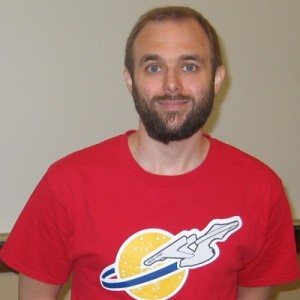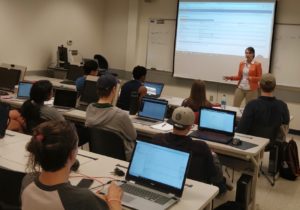DAC Student Spotlight: John Wenskovitch

John Wenskovitch, DAC Ph.D. student in computer science
John Wenskovitch’s research interest is centered around the idea of creating interactive visualization systems that learn from user interactions. This often takes the form of conducting exploratory data analysis on high-dimensional, numerical datasets and using a common visualization technique, 2D scatterplot, to project the data.
When asked if he could explain his work to someone not in the computer science field, Wenskovitch, a Ph.D. student at the Discovery Analytics Center, turned to the stars.
“Stars have a variety of properties including color, temperature, luminosity, mass, radius. If you project that high-dimensional data into the 2D scatterplot, the stars will naturally start to form groups because stars in the high-dimensional space also have groups like red giants, blue giants, white dwarfs, main sequence, etc.,” Wenskovitch said. “By manipulating the scatterplot, perhaps the system can learn that the user is interested in understanding the relationship between color and luminosity. After recognizing that interest, the system can learn that these high-dimensional attributes are important to the user and adapt the projection, with the result of something approximating a Hertzsprung–Russell diagram.”
How did he gravitate to this particular research area?
“I was the kid who was interested in everything. As a result, I had a really hard time choosing a major when I started undergrad. Eventually, I settled on computation because it is a very interdisciplinary field and gave me the ability to pursue a variety of interests,” said Wenskovitch. “Visualization is probably the most interdisciplinary subfield of computer science since its goal is to help everyone better understand their data. I have worked on visualization research projects with astronomers, cell biologists, nurses, statisticians, and artists.’
Wenskovitch earned a bachelor’s degree in software engineering with a minor in mathematics and a multimedia focus area from Gannon University and a master’s degree in computer science from the University of Pittsburgh. He said that his current research gives him the ability to exercise both his programming and mathematics skills, while also interacting with domain experts in a wide variety of fields.
“I like the fact that — as a student at the Discovery Analytics Center — I can walk down the hall whenever I want and have an interesting conversation with another grad student or faculty member who is working on something fascinating but completely different,” said Wenskovitch, who is advised by Chris North. “DAC has also provided a lot of interesting, inter-related problems to work on.”
Later this month, Wenskovich will present a poster, “Simultaneous Interaction with Dimension Reduction and Clustering Projections,” at the 24th International ACM Intelligent User Interfaces Conference in Los Angeles.
To date, Wenskovitch has given talks in nine countries on five continents, including papers at the IEEE VIS conference: “Towards a Systematic Combination of Dimension Reduction and Clustering in Visual Analytics” in 2017 and “The Effect of Semantic Interaction Foraging in Text Analysis” in 2018.
He is currently working with his supervisor and colleagues from a Summer 2018 internship at Fuji-Xerox Palo Alto Laboratory (FXPAL) to turn the work they did on building a software visualization assistant to help with navigation and visual debugging in computational notebooks into a paper for VIS 2019.
He has also taught college classes since 2012, including at Virginia Tech, and was a visiting assistant professor at Allegheny College before joining DAC in Fall 2016. He is projected to graduate in Summer 2019 and would like to remain in academia.
Wenskovitch said he likes living in Blacksburg, with its easy access to mountain hiking. “It is a small town where I can see the Milky Way from my driveway, but it is still quite cosmopolitan,” he said.

